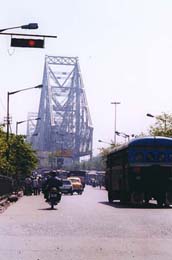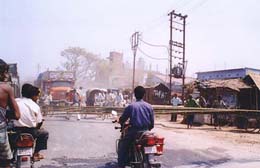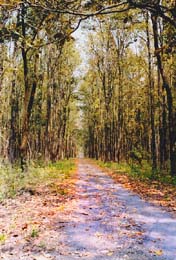|
|

|
WEST BENGAL
 The
moment you come out of the Kolkotta railway station the first
thing that catches your sight is the Howrah Bridge, you can't
help but stand and admire it. Kolkotta is a very busy place
with lot of Bihari's from the neighboring state, but it has
got it's heart in the right place. The
moment you come out of the Kolkotta railway station the first
thing that catches your sight is the Howrah Bridge, you can't
help but stand and admire it. Kolkotta is a very busy place
with lot of Bihari's from the neighboring state, but it has
got it's heart in the right place.
How often does a traffic cop stop you to let a tram pass on
Indian roads? The Trams are old and in bad condition, but they
remind you of their glorious past.
Art is a way of life here, old buildings are well preserved,
details are not ignored and that makes the city special and
unique.
Language changes in each state of India, and Kolkotta is no
different, Bengali is spoken fast and furiously. Small restaurants
are called cabins and crossroads with a circle in center are
called island, a term that confused me navigating through the
city for the first day.
From Kolkotta we were riding up north to Guwahati, parallel
to the Bangladesh Border.
 The
highway is narrow, mad traffic and maniac drivers but West Bengal
is very beautiful, it's GREEN, it almost felt like riding in
Kerala (Southern state of India, also known as God's own Country) The
highway is narrow, mad traffic and maniac drivers but West Bengal
is very beautiful, it's GREEN, it almost felt like riding in
Kerala (Southern state of India, also known as God's own Country)
West Bengal has to be called "Bicycle Land" millions
of cycles everywhere, even on the freaking highway.
That answered my question as to why Rani Mukheerji (Film Actress
originating from WB) was in a commercial for bicycles :o)
The ride is monotonous till Siliguri (600 Kms.), from here onwards
Thick Forest, Steep Ghats, Tea estates and Lush green rice fields
make the ride more enjoyable.
On my way to Guwahati, we saw the signboard for Buxa Tiger Reserve,
since wandering and surprising oneself was the idea behind the
ride, we took the turn and at the Nature Interpretation center
in the sanctuary, forest department had many animals in the
rescue area apart from bears and panthers.
Curious to see Royal Bengal Tiger in his natural habitat, we
changed plans and rode to Alipurduar. One has to take permission
from the Deputy Field Director at Alipurduar to enter the National
Park. We got lucky! Not only did we get the permission to visit
the park, but the officer also booked a suite in the VIP forest
guest house which was 16 Kms. inside the forest and with that
special permission we wouldn't have to hire a jeep but could
move around on the bike.
God is kind to bikers after all :)
We checked in a shady hotel by the name Moon Light and the moment
we started to unpack earthquake rocked the place, cheap cots
were shaking like mad. After seconds of panic, everything was
back to normal.
 Early
morning next day we reached the forest check-post at the national
park. The guard at the check post responded to our excitement
with and smile, and than came a warning, "make sure you
look left and right while riding, elephants kill more than 100
humans here every year." After that, there was only one
man smiling, no points for guessing who? The idea didn't sound
as bright as it did the other day, but heck we were riding on
the forest road barely five feet in width, thick forest on both
sides with thicker undergrowth, hoping not to be greeted by
a smiling or a grumpy elephant. Early
morning next day we reached the forest check-post at the national
park. The guard at the check post responded to our excitement
with and smile, and than came a warning, "make sure you
look left and right while riding, elephants kill more than 100
humans here every year." After that, there was only one
man smiling, no points for guessing who? The idea didn't sound
as bright as it did the other day, but heck we were riding on
the forest road barely five feet in width, thick forest on both
sides with thicker undergrowth, hoping not to be greeted by
a smiling or a grumpy elephant.
Slowly the sounds of traffic gave way to birds, insects and
animal sounds.
Luckily no elephants wanted to say hi to us and we reached Jainti
Guest House.
Jainti is a small village inside the park. It wasn't as secluded
as I thought it would be. There is a bus service to the village
for the locals in the morning and evening.
The guesthouse on the banks of dry Jainti River is luxurious
and peaceful.
After unpacking we went for a five Km. uphill trek to a place
called PUKRI MAI. Pukhri means pond on the hill and Mai means
mother.
Pukhrimai is a natural pond on a hilltop, the water doesn't
dry up throughout the year, and it is a holy site for Hindus
and Buddhist.
It is one of the recongnised trekking routes in the National
Park otherwise entering or going on foot is prohibited in all
National Parks in India.
The lake is small and the water is muddy, elephants visit here
frequently for baths, hundreds of fish in the pond can be hand
feed, since the lake is considered holy, no one dares to fish
here.
Evenings were best spent at the small village maidan under a
huge banyan tree chatting with locals and sipping on whiskey
from Bhutan. The Whiskey costs 90 bucks for a bottle, and has
a picture of a snow capped peak on the label and is surprisingly
named Black Mountain :o)
In Jainti, Bhutanese currency is also valid, so if the shopkeeper
doesn't have 50 Indian he will give you 50 Bhutanese, well that
can give you a chance to brag about your visit to Bhutan too
;)
Inquiring more about the place got to know of Buxa Fort on the
other side of the park, and that too was a recognised trek.
Early next day in light drizzle, started the ride to Buxa Fort.
You have to ride six Kms. in the forest to the next forest check
post and trek five Kms. from there to the fort.
The trek is steep, it is impossible to ride the bike on the
track, and that's what makes one wonder that how horse carriages
used to ply on this roads decades ago. Locals say that at one
point Netaji Subhash Chandra Bose was jailed here so that made
the trek more interesting.
A small village appears on the hilltop and from there it is
downhill trek for the fort, till the village the path was clear,
only one track to follow, but after the village there were too
many of them. We took the one we thought would go to the fort,
as there was nobody we could ask the way. The path led us to
the stream instead. Anyways, sat down the stream and abandoned
the search for the fort.
Another round of Black Mountain with the locals and next day
early in the morning on another trek saw barking dears and spotted
dears.
Buxa Tiger Reserve is a great place for nature lovers; don't
miss Buxa Tiger Reserve when you visit this part of India, though
animals and snakes here are camera shy.
Having spent a relaxed time with nature we were again on the
highway to Assam.
^Top |
|